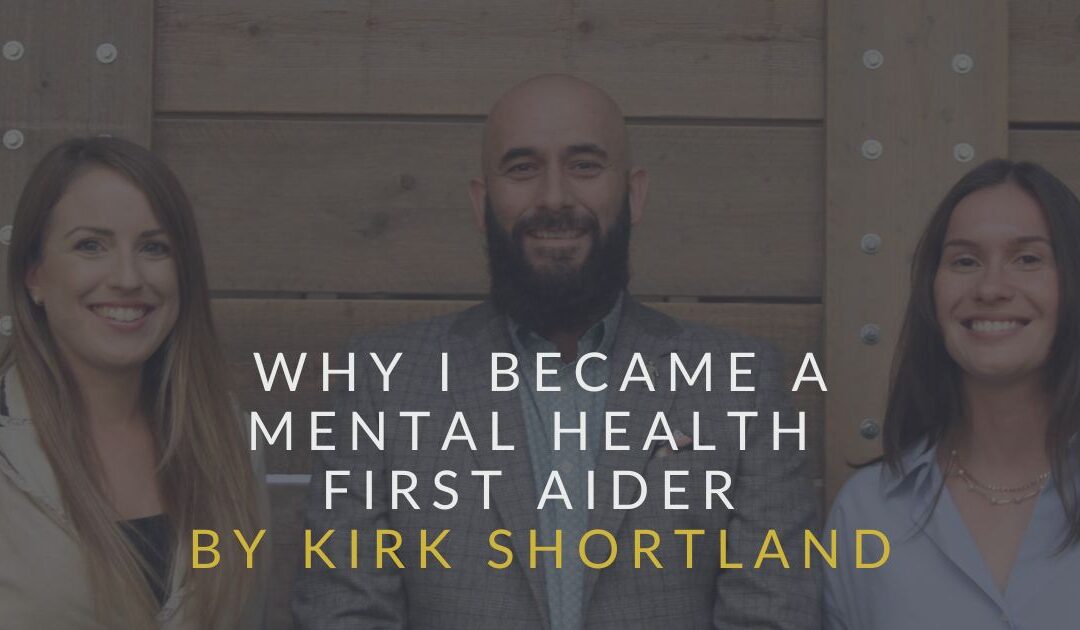Why I Became A Mental Health First Aider
Cogito’s Learning and Development Specialist, Kirk Shortland, provides an insight into why he became a Mental Health First Aider.
Having worked for the UK’s largest non-Metropolitan Fire & Rescue Service for 15 years, I had always had a fascination with ‘response’ and how to be able to provide a level of service, to any given situation, to improve that situation for an individual at any given moment. I have held various forms of physical First Aid and Trauma Care certification since the late 90’s, so it seemed that becoming a First Aider for Mental Health was the next logical step.
Personal Experience
Having been through a personal mental health journey of my own in the Fire Service, being diagnosed with Post-Traumatic Stress Disorder (PTSD), I felt that having a commonality would be a way of applying my personal learning from this journey to benefit others. This has been particularly useful in my role as a nationally accredited mental health and wellbeing instructor.
What I love most is that being a workplace based Mental Health First Aider can play a key part in supporting colleagues. Not only that, but this is real skill for life. It’s usefulness extends beyond the workplace into your home, benefiting your family, friends and your wider community. Normalising these environments removes the stigma around mental health and wellbeing, which in turn allows for natural conversations, making the topic less taboo.
Personally, when you choose to embark on such a course, it’s a joy to learn and ultimately your learning curve is fairly vertical. The insight gained on a wide range of mental health conditions has been so valuable, covering everything from stress and anxiety to suicide and psychosis. There was so much that I didn’t previously understand or consider, let alone how to pick up on emotional behaviours, signs, and symptoms. It’s fair to say that my emotional intelligence has been heighted as a result of completing the Ofqual regulated qualification.
Being a Mental Health First Aider makes you an important part of an organisation’s health and wellbeing strategy. But to perform your role effectively and safely at work, training should be one part of a whole organisation approach. You need the full support of your employer, which should include an effective strategy, policies and procedures, and clear communication of your role and how you will be supported.
The Importance of Connection
As more organisations implement hybrid or fully remote working, connection is becoming more important. Remote working can increase feelings of loneliness and isolation, which are risk factors for poor mental health. Fortunately, the principles of Mental Health First Aid are the same whether you are supporting someone face to face or from a distance. However, the way you apply these principles might be different.
Over the years, I have supported a number of individuals, being a trusted person, signposting and supporting someone as they navigate their own mental health continuum is something I find extremely rewarding. It has also allowed me to build my own support network and integrate positive mental wellbeing habits of my own and ultimately adjust my narrative to be more inclusive at work and home.
A recent survey by red-umbrella.co.uk highlighted that having a Mental Health First Aider in the workplace can demonstrate an organisation’s commitment to employee mental health and wellbeing. Depending on the size of the organisation, a company might wish to consider training a percentage of its workforce, they suggest a minimum of 15%.
Mental Health First Aid also facilitates healthy, sustainable and trusting relationships between employees and their management teams by encouraging workers to speak up if they are facing any problems.
Becoming a Mental Health First Aider
Companies also benefit from having staff who are enjoying positive mental wellbeing. Mental wellbeing initiatives have been seen to create better leaders and highly motivated teams. As well as this, red-umbrella.co.uk also reported that for every £1 spent on mental wellbeing, £5 is made, showing a significant return on any mental health investment.
If you are thinking of becoming a Mental Health First Aider or if you would like members of your organisation to become Mental Health First Aiders feel free to contact me to discover more about what it entails and how I might be able to help.
Chat with Kirk

Read More About Our Mental Health Courses
Our bespoke mental health and wellbeing training courses can show you how to effectively support your employees and increase engagement, motivation and productivity.





